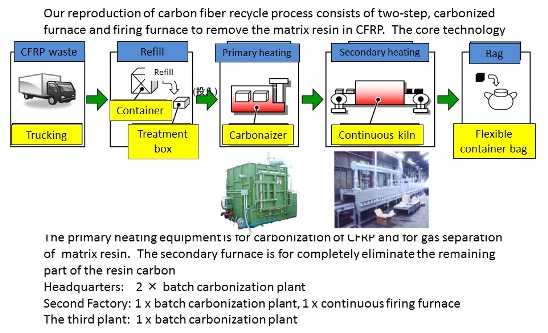Category of Materials and Microparticulate
Development of carbon fiber recycling technology from carbon fiber reinforced plastic (CFRP) / NEDO project in 2010-2012
Demand of carbon fiber is increasing rapidly for the purpose of improving fuel cost of aircrafts and cars because of the lightweight with high strength and high modulus. As the main use, however, carbon fiber reinforced plastic (CFRP) are difficult to recycle by itself and the waste products and the residue in production process are mostly landfill discarded.
In our laboratory, the energy-saving technology for recycling carbon fiber has been developed as follows (in detail):

Effect of trace elements on power generation characterization of fuel cell / NEDO project in 2008-2012
Coal gasification gas will be used in large-scale power generation
using solid oxide fuel cell (SOFC). However, there are various trace metals
in coal gasification gas. In our laboratory, the effect of the trace elements
on metal corrosion in an electrode cell of SOFC has beeninvestigated by
the thermodynamic equilibrium calculations under the condition of the simulated
gasification gas and the exposure experiments with an electrical furnace.
The in situ observation of the surface of a button cell in the exposure
experiments has been carried out by using the microscope with a hot-stage
to kinetically follow the behavior of the precipitation of metals such
as nickel on the surface of the cell.
In addition, recently, the effect of trace ammonia in the flue gas, from
the production process of hydrogen from ammonia using plasma, on the power
generation characterization of polymer electrolyte fuel cell (PEFC) has
been investigated.
-
Polymer coating using photochemistry
In the study, the method using photochemistry has been investigated to coat various materials using 2-Methacryloyloxyethyl Phosphorylcholine (MPC) polymer, having higher biocompatibility and water retentivity.
Study of lithium ion batteryLithium ion battery is used in a hybrid car. However, the mechanism of abnomal ignition from the battery is not known. In our laboratory, the mechanism for the dangerousness of lithium ion battery has been investigated.


